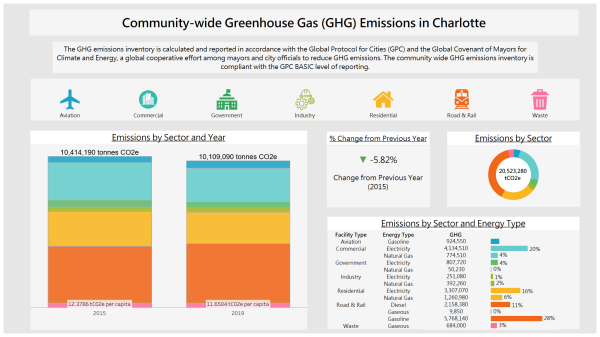Charlotte’s electric bike program and solar installations among many Strategic Energy Action Plan wins

City of Charlotte
Have you heard of Charlotte’s Strategic Energy Action Plan (SEAP)? Sustain Charlotte was part of a coalition of nonprofits that advocated for SEAP and helped secure its adoption in 2018. The plan charts a course for Charlotte to become a low carbon city by 2050. That’s less than 2 tonnes of CO2 equivalent per person annually.
On Monday night, Charlotte City Council received an update on the SEAP from Chief Sustainability and Resiliency Officer Sarah Hazel. Hazel shared that the SEAP dashboard, a “data depot to communicate the indicators of the SEAP implementation,” is constantly being updated with the latest information. It also serves as an accessible, community-wide resource so everyone can track our progress on lowering emissions.
We were particularly pleased to hear about the resounding success of the city’s electric bike program in the Corridors of Opportunity. Hazel pointed out that bike rides are a significant strategy to accomplish short trips and reduce emissions. Imagine: how much could we reduce our carbon footprint if we rode a bike a mile or two miles to the grocery store instead of taking our car?
Hazel also noted that Charlotte has received several awards, recognitions, and grants this past year for our sustainability work, including ranking as the 14th highest local government with sustainable operations in the nation (ACEEE, 2024).
Hazel and the sustainability team are working with a contractor to update the SEAP with new climate science, modern technology, and a strong equity lens. The update is scheduled to be complete in early 2025, and we will be sure to share community engagement opportunities as they are available.
As several members of City Council noted, this is a lot of work being taken on by a small team. They are doing an excellent job of working with city staff, nonprofits, and community groups while continuing to make strides towards a low-carbon city.
Going forward, we would like to see data on transit and sidewalks included in the SEAP dashboard as we know these modes of transportation are also key to reducing our emissions. We will be in touch with the sustainability team to make this happen.
Later in the evening, City Council also voted to approve a block grant from the Department of Energy to launch a campaign called Solarize Charlotte-Mecklenburg. This campaign increases solar installations by reducing barriers and costs through group purchasing power. It is specifically designed to provide solar installations for low- and moderate-income homes. Once implemented, previously under-invested neighborhoods will see reduced energy burden, greenhouse gas emissions, and energy costs. This program has seen great success in other communities including Raleigh.
Hazel shared that Charlotte is within 20% of hitting the goal of powering our buildings with zero carbon sources and that we are projected to offset all of our electricity use by zero carbon source by 2030.
Also, the City’s solar panel energy production from 19 panels is now equivalent to 175 homes’ electricity use for one year. Communitywide, there are 3900 solar panels (22% increase in residential from last year and 20% increase in commercial from last year).
To learn more about Charlotte’s initiatives with building energy efficiency, solar energy generation, and electric vehicle (EV) infrastructure, we encourage you to watch the meeting recording starting at minute 25.
Thanks for reading!
As a nonprofit, community support is essential for us to keep doing what we do — including providing free articles like this. If you found this article helpful, please consider supporting Sustain Charlotte.
Want to stay in the loop? Subscribe to our weekly newsletter and follow us on Instagram, Facebook, and X.
